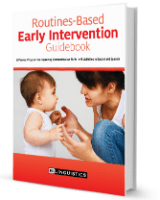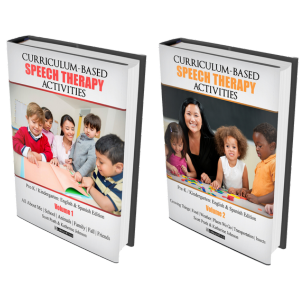
Parents can easily do speech therapy activities in the home while going about their daily routines. At Bilinguistics we work across many different settings, and there are aspects of each of them that I love. I have a soft spot in my heart for Early Childhood Intervention (ECI), the birth-to-three-year-old program. Perhaps it’s because I started my career working in early intervention in inner city Baltimore. Or maybe it’s because I love that in the ECI setting, we have the most amazing opportunity to work with the families of these kids. And when we give families what they need to implement speech therapy strategies, they can make an enormous difference in their child’s development.
Speech Therapy in Early Childhood Intervention: Working with Birth-to-Three-Year-Olds and their Families
Recently, I had the opportunity recently to provide speech therapy for an Early Childhood Intervention program in rural Central Texas. I want to share with you an exchange I had with an awesome mom, Sylvia. Sylvia and I have a lot in common. We both have three kids. We both work outside of the home as well as inside the home. And, we both have a child with special needs. Sylvia told me that she had the best intentions of working with her child on his speech and language skills. She walked across the room and picked up a bag that was tucked into a corner next to the sofa. She pulled out a bunch of educational materials that she planned to use to teach her child his speech and language skills. And she looked at me and said, with tears in her eyes, “I feel so guilty, but I just never find the time.”
Speech therapy in the home at its finest
In between her exchanges with me, her son came up to her several times. He wanted her to open a bag for her. She held her hands out and made the sign for open and looked at her son and said, “open” and then “abre” (Spanish for “open”) and reached for his hands to show him how to make the sign. He approximated the word “abre,” saying, “abeh,” while imitating the sign with his hands. Sylvia then opened the bag for him. Next he wanted something from a cabinet in the kitchen. He pointed and vocalized. She reached into the cabinet, grabbed two items, and asked, “Do you want the cereal or the raisins?” He pointed to raisins. She said, “Raisins, I want raisins,” and gave him a few.
“Sylvia,” I said, you need to drop the guilt right now. And forget about the bag. You are doing an excellent job of enriching your son’s speech and language skills. You don’t need to schedule a time to sit down with a bag of educational materials. You can do this throughout your day. In fact, you are doing it.” I then walked her through the five strategies I witnessed her using between sentences with me. Then, we talked about ways she could use strategies throughout the many routines of her day.
 Speech Therapy in Daily Routines
Speech Therapy in Daily Routines
I showed Sylvia the Routines-Based Early Intervention book that Scott Prath and colleagues created at Bilinguistics. It was created during a time when we were doing a lot of work in ECI and many of us felt like our every-other-week visits were not as impactful as they could be. At that time I was also receiving ECI visits for physical therapy and occupational therapy for my son, and I often felt overwhelmed with the number of strategies that were thrown at me during a session, with nothing written down to help me remember as I made my way through a typical crazy week with three kids and a job. We knew when we started working on a book that we needed to give parents ideas that were easily implemented throughout the every day routines (like bath time, meal time, and grocery store trips). And, we knew we needed to give parents strategies that were easy to use. Sylvia had a huge sense of relief after we talked about all of the ways she can, and more importantly, is, helping her son.
Parents make an Impact on their Children’s Speech and Language Development.
So, SLPs, let’s help empower our parents with great speech and language enrichment strategies to use with their young children. Help them drop any guilt they might have and encourage them to add more fun and easy language enrichment strategies to their daily routines.
For more information about working with families, check out these courses:


 Speech Therapy in Daily Routines
Speech Therapy in Daily Routines


